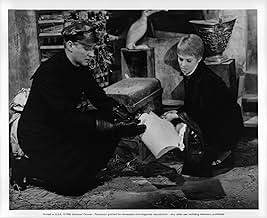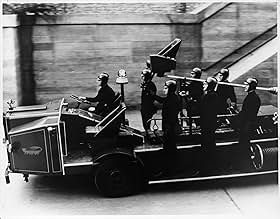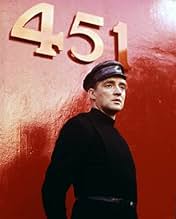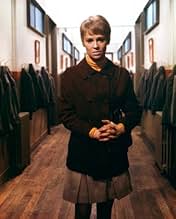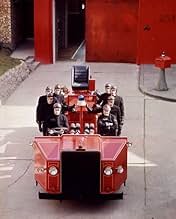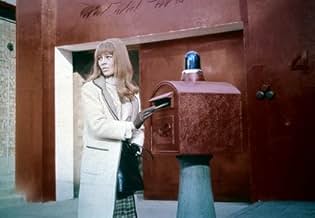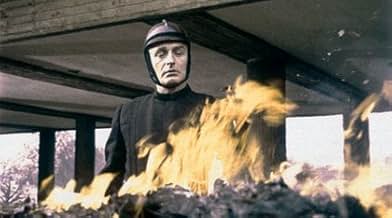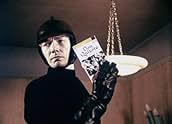Fahrenheit 451
- 1966
- Tous publics
- 1h 52m
IMDb RATING
7.2/10
47K
YOUR RATING
In an oppressive future, a fireman whose duty is to destroy all books begins to question his task.In an oppressive future, a fireman whose duty is to destroy all books begins to question his task.In an oppressive future, a fireman whose duty is to destroy all books begins to question his task.
- Nominated for 1 BAFTA Award
- 1 win & 4 nominations total
Gillian Aldam
- Judoka Woman
- (uncredited)
Alfie Bass
- Book Person: 'The Prince'
- (uncredited)
Yvonne Blake
- Book Person: 'The Jewish Question'
- (uncredited)
Arthur Cox
- Male Nurse
- (uncredited)
Frank Cox
- Book Person: 'Prejudice'
- (uncredited)
Fred Cox
- Book Person: 'Pride'
- (uncredited)
Noel Davis
- Cousin Midge - TV Personality
- (uncredited)
Judith Drinan
- Book Person - Plato's 'Republic'
- (uncredited)
Kevin Eldon
- Robert - First Schoolboy
- (uncredited)
Featured reviews
This is a thought-provoking and poignant story happens in an oppressive and odd far world , a strange and terrifyingly mechanised society . It describes future Earth civilization with television a universal father-figure poring out messages , there a fireman whose duty is to destroy all books begins to question his task . This is the best adaptation of a Ray Bradbury book to hit the big screen , furthermore quite faithful to the tone of the story. It deals with a fire fighter named Montag ( Oscar Werner ) works in the line of duty as responsible for the destruction of materials , but he begins to question about the necessity of his job . Guy Montag is a veteran fireman who is much respected by his superiors (Cyril Cusack) from fire department and is in line for a promotion . Montag doesn't wonder what he does or why he does it until he deals with Clarisse ( Julie Christie in double role also as Montag's wife ). As his doubts enhance , he starts to rob some books he is about to burn . But a work's companion named Fabian (Anton Driffing) suspects about his hidden activity .
It's an intriguing type of story with Science-Fiction leanings and stretching rather far for some of the plot points . This cerebral picture is full of cinematic and literary references as Charles Dickens-David Copperfield- , Robert Stevenson , James Joyce and many others . The interesting story , generally slow-moving , mingles the genres of Dystopian science fiction and suspense film . It contains an intelligent and surprising ending , Truffaut's own invention , with the rebels wandering in idyllic exile by the edge of a glittering icy lake . Although set far in the future , there are no great special effects or elaborate sets ; despite , the movie was filmed in real locations by prestigious cameraman Nicolas Roeg , subsequently filmmaker , in Danebury Avenue, Roehampton, London, England, UK (opening sequence, block of flats) ,Linkway, Edgcumbe Park, Crowthorne, Berkshire, England, UK(Montagu's bungalow)Black Park, Iver Heath, Buckinghamshire, England, (Monorail),Fortismere Secondary School, Maidenhead, Berkshire, England, UK and Loiret, France , though most scenes were shot in Pinewood Studios . It is colorfully photographed in bright and gleaming red . Suspenseful and thrilling musical score by the classic Bernard Herrmann , Alfred Hitchcock's usual . The flick is stunningly directed by Francois Truffaut , in his fist English-language movie treating the subject of literature and tyranny with a intelligence and dignity not found in other films . This is one of the best of his suspense movies along with ¨ La Sirene du Missisipi ¨ and ¨Shoot the piano player¨. Rating : Very good , above average and well worth watching .
L
It's an intriguing type of story with Science-Fiction leanings and stretching rather far for some of the plot points . This cerebral picture is full of cinematic and literary references as Charles Dickens-David Copperfield- , Robert Stevenson , James Joyce and many others . The interesting story , generally slow-moving , mingles the genres of Dystopian science fiction and suspense film . It contains an intelligent and surprising ending , Truffaut's own invention , with the rebels wandering in idyllic exile by the edge of a glittering icy lake . Although set far in the future , there are no great special effects or elaborate sets ; despite , the movie was filmed in real locations by prestigious cameraman Nicolas Roeg , subsequently filmmaker , in Danebury Avenue, Roehampton, London, England, UK (opening sequence, block of flats) ,Linkway, Edgcumbe Park, Crowthorne, Berkshire, England, UK(Montagu's bungalow)Black Park, Iver Heath, Buckinghamshire, England, (Monorail),Fortismere Secondary School, Maidenhead, Berkshire, England, UK and Loiret, France , though most scenes were shot in Pinewood Studios . It is colorfully photographed in bright and gleaming red . Suspenseful and thrilling musical score by the classic Bernard Herrmann , Alfred Hitchcock's usual . The flick is stunningly directed by Francois Truffaut , in his fist English-language movie treating the subject of literature and tyranny with a intelligence and dignity not found in other films . This is one of the best of his suspense movies along with ¨ La Sirene du Missisipi ¨ and ¨Shoot the piano player¨. Rating : Very good , above average and well worth watching .
L
Go figure that I had the privilege of seeing "Fahrenheit 451," for free, on a big screen a few years back (an independent Illinois art house had gotten hold of what was allegedly one of the last surviving prints), and at the time hadn't the foggiest concept of how PRIVILEGED an event it was. Sitting in a theater crowded with college students on a budget with nothing better to do, I watched this diverting little retro item, appreciated its subtlety, nuance, bold visual style, and 'got' the message that if we're not careful, we'll be mindless drones having our desires dictated by The Tube (in current times, that's hardly a profound statement).
Francois Truffaut's adaptation of Ray Bradbury's novel is a bold visual feast that presents a time that might seem 'retrograde' in the eye of a modern pop-culture snob, but ultimately projects what a conceivable 'future' might look like (and not that CGI malarkey served up in "The Matrix"). Interiors of houses are awash in odd colors and give shelter to appliances that don't look dissimilar from our own; TV screens embedded in living-room walls play programs which vacuous housewives interact with sometimes. The film is so relentlessly confident in its appearance that it withstands the test of time.
Though if "Fahrenheit 451" only had its storybook style to rely on, it would fade and be filed away as a mere technical achievement. Truffaut, working from strong source material, concocts a riveting parable about ignorance and the things we, as humans, take for granted. The story follows Guy Montag, an Everyman who is employed as a fireman--a connotation which entails ransacking residences in search of books (reading and writing have been outlawed in this world) and burning them. He has a medicated-smile wife (Julie Christie), a quiet home life, and is in line for a promotion, until a neighbor (Christie again) inspires him to question his motives for working such a sordid job.
One character argues that books cause depression, making people confront unpleasant feelings. "Fahrenheit 451" sometimes runs the risk of lending truth to that statement--in some ways, it is a bleak commentary on civilization, but at the same time grounded in a benevolent humanity that offsets Orwell's brutal, pessimistic world of "1984" (though both texts and films share similar themes). This humanity is underlined in an upbeat, even comic ending (the details of which I won't divulge here).
"Fahrenheit 451" is a spellbinding work of art, in good company with other incendiary works ("A Clockwork Orange" and "Fight Club" come to mind) that have defied the constraints of time and age.
Francois Truffaut's adaptation of Ray Bradbury's novel is a bold visual feast that presents a time that might seem 'retrograde' in the eye of a modern pop-culture snob, but ultimately projects what a conceivable 'future' might look like (and not that CGI malarkey served up in "The Matrix"). Interiors of houses are awash in odd colors and give shelter to appliances that don't look dissimilar from our own; TV screens embedded in living-room walls play programs which vacuous housewives interact with sometimes. The film is so relentlessly confident in its appearance that it withstands the test of time.
Though if "Fahrenheit 451" only had its storybook style to rely on, it would fade and be filed away as a mere technical achievement. Truffaut, working from strong source material, concocts a riveting parable about ignorance and the things we, as humans, take for granted. The story follows Guy Montag, an Everyman who is employed as a fireman--a connotation which entails ransacking residences in search of books (reading and writing have been outlawed in this world) and burning them. He has a medicated-smile wife (Julie Christie), a quiet home life, and is in line for a promotion, until a neighbor (Christie again) inspires him to question his motives for working such a sordid job.
One character argues that books cause depression, making people confront unpleasant feelings. "Fahrenheit 451" sometimes runs the risk of lending truth to that statement--in some ways, it is a bleak commentary on civilization, but at the same time grounded in a benevolent humanity that offsets Orwell's brutal, pessimistic world of "1984" (though both texts and films share similar themes). This humanity is underlined in an upbeat, even comic ending (the details of which I won't divulge here).
"Fahrenheit 451" is a spellbinding work of art, in good company with other incendiary works ("A Clockwork Orange" and "Fight Club" come to mind) that have defied the constraints of time and age.
From Ray Bradbury's novel about totalitarian society that has banned books and printed words in order to eliminate independent thought; Oskar Werner plays professional book-burner who becomes enraptured with stories. Possibly a bit too thin at this length, but a fascinating peek at a cold future (which the times have just about caught up to). Didn't get a warm reception from critics in its day, yet the performances by Werner and Julie Christie (in a dual role as both Werner's wife and a rebel acquaintance) are top notch. I was never a fan of director François Truffaut's too-precious stories of childhood, but this film, curiously his only English-language picture, is extremely well-directed; the sequence with the woman and her books afire is one amazing set-piece, with tight editing, incredible and precise art direction, and the camera in all the right places. Truffaut lets you feel the agony of book paper curling up black in a mass of orange flames, and the proud defiance of the woman as she herself strikes the match. Unforgettable. *** from ****
In a future where books have been outlawed, firemen are paid to burn books instead of put fires out. However, one fireman realizes that what he is doing is wrong and decides to go against the degenerate society he lives in.
I have read reviews of this movie calling it "boring" and "outdated," and frankly I am amazed by how ignorant some people can be. Calling "Fahrenheit 451" outdated simply because the set designs look old and because there are no flashy computer effects shows that you have completely missed the point. The people who made this were not trying to give you a spectacle, they were trying to give you a message - a message that is even more important today than it was when this movie came out.
"Fahrenheit 451" is a fine adaptation of Ray Bradbury's classic novel about censorship. The movie changes many of the book's events, but the spirit of the book is preserved. The cinematography is truly great and the score is quite powerful. The acting is also great. Oskar Werner is right on the money as Montag the fireman. Julie Christie is wonderful playing dual roles as yin and yang: Montag's zombie-like wife, Linda, and Montag's friend, the young and energetic Clarisse. Cyril Cusack is also memorable as the evil Fire Captain Beatty - he isn't a cartoon villain, but a very realistic and human character.
You may think that "Fahrenheit 451" delivers an irrelevant message. You may think that book burning is a thing of the past, a relic of Nazi Germany and Communist Russia. Look around you - book burning happens every day! How do you feel about people trying to ban "The Adventures of Huckleberry Finn" because the word "nigger" is used in it? How about whole sections of "Doctor Dolittle" being rewritten so that they are politically correct? Did you know that school textbooks may not make any mention of Mount Rushmore because it is offensive to a certain Indian tribe? Meanwhile, we are watching our giant-screen TVs and listening to our Walkmans (two inventions that were predicted by Bradbury). We are constantly "plugged in" and never take any time to just sit and think. Look around you - Ray Bradbury's story is coming true. I advise you to watch this movie, and to read the book. (Read the book first. You will appreciate the film more.)
I hear that a remake is in the works. No doubt it will be filled with gaudy special effects and silly Hollywood cliches. I guess I should hold off judgment until I actually see it, but I doubt that it will contain any of the genius that can be found in this sadly underrated gem. It will be interesting to see what they do with the mechanical hound, though....
I have read reviews of this movie calling it "boring" and "outdated," and frankly I am amazed by how ignorant some people can be. Calling "Fahrenheit 451" outdated simply because the set designs look old and because there are no flashy computer effects shows that you have completely missed the point. The people who made this were not trying to give you a spectacle, they were trying to give you a message - a message that is even more important today than it was when this movie came out.
"Fahrenheit 451" is a fine adaptation of Ray Bradbury's classic novel about censorship. The movie changes many of the book's events, but the spirit of the book is preserved. The cinematography is truly great and the score is quite powerful. The acting is also great. Oskar Werner is right on the money as Montag the fireman. Julie Christie is wonderful playing dual roles as yin and yang: Montag's zombie-like wife, Linda, and Montag's friend, the young and energetic Clarisse. Cyril Cusack is also memorable as the evil Fire Captain Beatty - he isn't a cartoon villain, but a very realistic and human character.
You may think that "Fahrenheit 451" delivers an irrelevant message. You may think that book burning is a thing of the past, a relic of Nazi Germany and Communist Russia. Look around you - book burning happens every day! How do you feel about people trying to ban "The Adventures of Huckleberry Finn" because the word "nigger" is used in it? How about whole sections of "Doctor Dolittle" being rewritten so that they are politically correct? Did you know that school textbooks may not make any mention of Mount Rushmore because it is offensive to a certain Indian tribe? Meanwhile, we are watching our giant-screen TVs and listening to our Walkmans (two inventions that were predicted by Bradbury). We are constantly "plugged in" and never take any time to just sit and think. Look around you - Ray Bradbury's story is coming true. I advise you to watch this movie, and to read the book. (Read the book first. You will appreciate the film more.)
I hear that a remake is in the works. No doubt it will be filled with gaudy special effects and silly Hollywood cliches. I guess I should hold off judgment until I actually see it, but I doubt that it will contain any of the genius that can be found in this sadly underrated gem. It will be interesting to see what they do with the mechanical hound, though....
Fahrenheit 451" is a strange film, hard to describe. No one could have interpreted the classic Bradbury novel in the same bizarre, fascinating manner as Francois Truffaut. It's a book, and a film, about freedom, choices, individuality, and intellectual repression in a future where books are forbidden; where Firemen are men who start fires...fires in which they burn books.
It was also the first color film directed by Truffaut. Although he by all accounts was not happy about making a color film and found it a bit unsettling, color is used to great effect here; sparingly, except for the extreme shade of red that is seen throughout.
"Fahrenheit 451" is supposed to be the temperature at which book paper catches fire, as the protagonist Guy Montag (Oskar Werner) explains in a scene at the beginning. Guy is a Fireman who seems happy enough with his life until he is approached by a young woman named Clarisse (Julie Christie) on his way home from work one day. She starts up a conversation with him, and the two become friendly. She bewilders him but challenges him to think and feel....and read. And when he arrives home we see his wife (also played by Julie Christie, with long hair), sedated and watching the wallscreen (TV of sorts)...we see what his life is really like, although he had told Clarisse he was "happy"...he is not.
As his friendship with Clarisse grows, he starts to secretly take home, hoard, and read some of the books he finds in the course of his daily work, and as he reads, he becomes obsessed with the books. They become his mistress, and are what finally make him feel affection and warmth. And when he starts to feel and care, so do we.
The two single best scenes are a passionate one involving an old woman who refuses to leave her books, her "children" as she calls them; and the wonderful ending of the film. The countless, painful closeups of books as they are being burned are beautifully done, and difficult to watch.
Truffaut was a well-known disciple of Alfred Hitchcock's films, so when Hitchcock fired his long-time music collaborator Bernard Herrmann during the filming of "Torn Curtain", Truffaut was thrilled to acquire his talents for his own film. The score for "F451" is beautiful, and the film would not be nearly as effective without it.
Writer/producer/director Frank Darabont ("The Green Mile", "The Shawshank Redemption") is working on a new film of "Fahrenheit 451" this year. He says it won't be a remake of the original film.
It was also the first color film directed by Truffaut. Although he by all accounts was not happy about making a color film and found it a bit unsettling, color is used to great effect here; sparingly, except for the extreme shade of red that is seen throughout.
"Fahrenheit 451" is supposed to be the temperature at which book paper catches fire, as the protagonist Guy Montag (Oskar Werner) explains in a scene at the beginning. Guy is a Fireman who seems happy enough with his life until he is approached by a young woman named Clarisse (Julie Christie) on his way home from work one day. She starts up a conversation with him, and the two become friendly. She bewilders him but challenges him to think and feel....and read. And when he arrives home we see his wife (also played by Julie Christie, with long hair), sedated and watching the wallscreen (TV of sorts)...we see what his life is really like, although he had told Clarisse he was "happy"...he is not.
As his friendship with Clarisse grows, he starts to secretly take home, hoard, and read some of the books he finds in the course of his daily work, and as he reads, he becomes obsessed with the books. They become his mistress, and are what finally make him feel affection and warmth. And when he starts to feel and care, so do we.
The two single best scenes are a passionate one involving an old woman who refuses to leave her books, her "children" as she calls them; and the wonderful ending of the film. The countless, painful closeups of books as they are being burned are beautifully done, and difficult to watch.
Truffaut was a well-known disciple of Alfred Hitchcock's films, so when Hitchcock fired his long-time music collaborator Bernard Herrmann during the filming of "Torn Curtain", Truffaut was thrilled to acquire his talents for his own film. The score for "F451" is beautiful, and the film would not be nearly as effective without it.
Writer/producer/director Frank Darabont ("The Green Mile", "The Shawshank Redemption") is working on a new film of "Fahrenheit 451" this year. He says it won't be a remake of the original film.
Did you know
- TriviaThe film's credits are spoken, not read, in keeping with the film's theme of destruction of reading material.
- GoofsAfter Montag comes out of the first raid to burn the books, the placement of the fire protective clothing (helmet and gloves) are unnatural movements and appear to be a reverse run of film footage. This is further compounded by the fact that he walks backwards to get the flamethrower which has flame entering the nozzle instead of leaving the nozzle.
- Quotes
Guy Montag: To learn how to find, one must first learn how to hide.
- Crazy creditsThe beginning credits are spoken instead of written on the screen.
- Alternate versionsOriginally Noel Davis (who plays Cousin Midge) did the opening voice over. In the current version it is done by Alex Scott ("The Life of Henry Brulard" Book Person).
- ConnectionsFeatured in Night Gallery: The Different Ones/Tell David.../Logoda's Heads (1971)
- How long is Fahrenheit 451?Powered by Alexa
Details
- Release date
- Country of origin
- Official sites
- Languages
- Also known as
- Farenhajt 451
- Filming locations
- Châteauneuf-sur-Loire, Loiret, France(Monorail)
- Production companies
- See more company credits at IMDbPro
Box office
- Budget
- $1,500,000 (estimated)
- Gross US & Canada
- $509
- Opening weekend US & Canada
- $11,206
- Apr 25, 1999
- Gross worldwide
- $581
- Runtime1 hour 52 minutes
- Aspect ratio
- 1.66 : 1
Contribute to this page
Suggest an edit or add missing content



